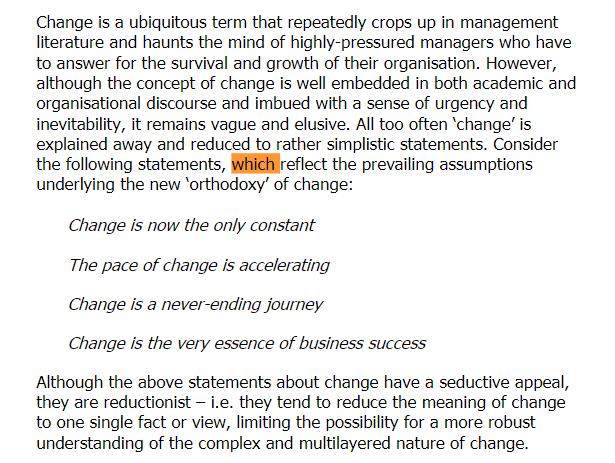Change is a ubiquitous term that repeatedly crops up in management literature and haunts the mind of highly-pressured managers who have to answer for

Change is a ubiquitous term that repeatedly crops up in management literature and haunts the mind of highly-pressured managers who have to answer for the survival and growth of their organisation. However, although the concept of change is well embedded in both academic and organisational discourse and imbued with a sense of urgency and inevitability, it remains vague and elusive. All too often 'change' is explained away and reduced to rather simplistic statements. Consider the following statements, which reflect the prevailing assumptions underlying the new 'orthodoxy' of change: Change is now the only constant The pace of change is accelerating Change is a never-ending journey Change is the very essence of business success Although the above statements about change have a seductive appeal, they are reductionist i.e. they tend to reduce the meaning of change to one single fact or view, limiting the possibility for a more robust understanding of the complex and multilayered nature of change. Change is a ubiquitous term that repeatedly crops up in management literature and haunts the mind of highly-pressured managers who have to answer for the survival and growth of their organisation. However, although the concept of change is well embedded in both academic and organisational discourse and imbued with a sense of urgency and inevitability, it remains vague and elusive. All too often 'change' is explained away and reduced to rather simplistic statements. Consider the following statements, which reflect the prevailing assumptions underlying the new 'orthodoxy' of change: Change is now the only constant The pace of change is accelerating Change is a never-ending journey Change is the very essence of business success Although the above statements about change have a seductive appeal, they are reductionist i.e. they tend to reduce the meaning of change to one single fact or view, limiting the possibility for a more robust understanding of the complex and multilayered nature of change. Change is a ubiquitous term that repeatedly crops up in management literature and haunts the mind of highly-pressured managers who have to answer for the survival and growth of their organisation. However, although the concept of change is well embedded in both academic and organisational discourse and imbued with a sense of urgency and inevitability, it remains vague and elusive. All too often 'change' is explained away and reduced to rather simplistic statements. Consider the following statements, which reflect the prevailing assumptions underlying the new 'orthodoxy' of change: Change is now the only constant The pace of change is accelerating Change is a never-ending journey Change is the very essence of business success Although the above statements about change have a seductive appeal, they are reductionist i.e. they tend to reduce the meaning of change to one single fact or view, limiting the possibility for a more robust understanding of the complex and multilayered nature of change.
Step by Step Solution
There are 3 Steps involved in it
Step: 1
Change is now the only constant is a very limiting in that change may be dynamic but does not mean t...
See step-by-step solutions with expert insights and AI powered tools for academic success
Step: 2

Step: 3

Ace Your Homework with AI
Get the answers you need in no time with our AI-driven, step-by-step assistance
Get Started


